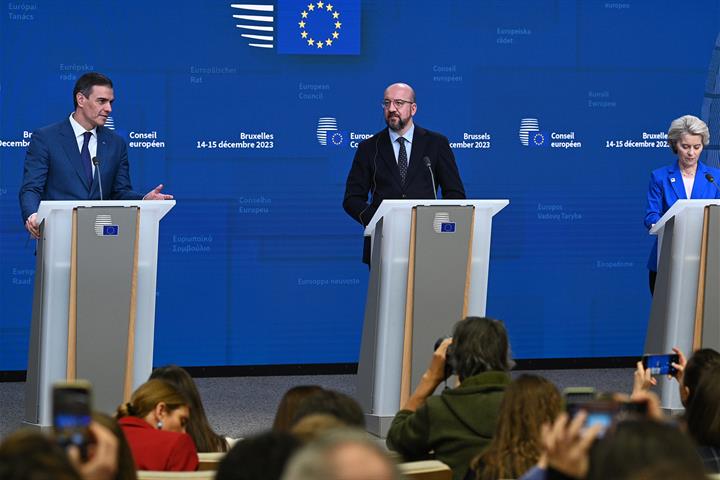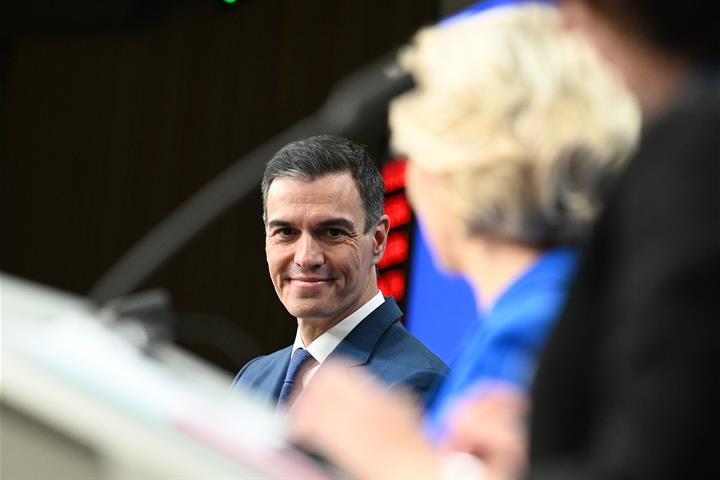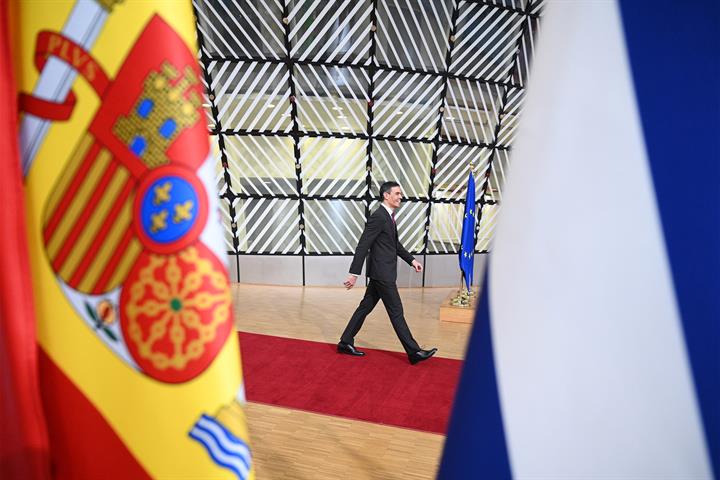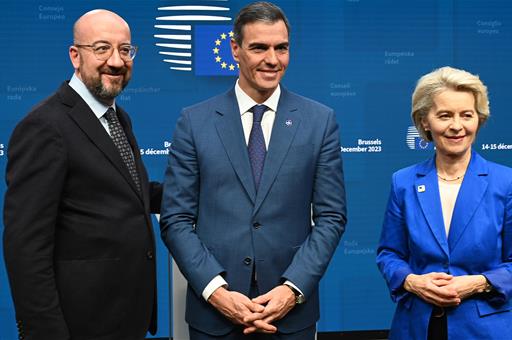Pedro Sánchez: "It is an honour for Spain that the opening of Ukraine's accession negotiations has taken place under our presidency"
President's News - 2023.12.15
Brussels (Belgium)
The Council was marked by a historic agreement reached on Thursday on the expansion of the EU: the opening of accession negotiations with Ukraine and Moldova.
"On 1 July, I had the opportunity to start the rotating presidency with a trip to Kyiv, and to meet with Zelenskyy to convey to him the clear will of all member states to approve the historic agreement reached yesterday", President Sánchez recalled. Following the agreement reached by the European Council, Ukraine and Moldova will start EU accession negotiations, and Georgia obtains candidate status. In addition, progress has been made for the candidatures of Bosnia and Herzegovina and other Western Balkan states. This agreement symbolises, once again, the EU's message of strong support for Ukraine. "It is an honour for Spain that the opening of Ukraine's accession negotiations has taken place under our presidency," he stressed.
Accession was one of the most significant issues to be discussed during this Council, together with the review of the Multiannual Financial Framework and the debate on the Middle East situation.
With regard to the debate on the revision of the Multiannual Financial Framework, the Spanish presidency of the EU Council has worked intensively on the Commission's proposal, which is essential to guarantee sufficient and stable economic support to Ukraine for the duration of the war and to address new challenges that have arisen in recent years, such as migration, external aid and economic competition. During this Council, the vast majority of European leaders have expressed their support for the Spanish proposal, considering it ambitious and constructive. "We have achieved something very important: we have secured an agreement at 26. I believe that under the Belgian presidency, we will count on the good work of the Belgian prime minister to achieve this agreement," he said.
 The President of the Government of Spain, Pedro Sánchez, the President of the European Council, Charles Michel, and the President of the European Commission, Ursula von der Leyen, during the joint appearance before the media | Pool Moncloa/Borja Puig de la Bellacasa
The President of the Government of Spain, Pedro Sánchez, the President of the European Council, Charles Michel, and the President of the European Commission, Ursula von der Leyen, during the joint appearance before the media | Pool Moncloa/Borja Puig de la Bellacasa
The third issue that the 27 took up for discussion was the grave situation in the Middle East. The October European Council set out a common position on a number of elements, including both calling for humanitarian pauses and contributing to a political process on a two-state basis. Moreover, in the conclusions, the 27 endorsed Spain's proposal to hold an international peace conference soon. Given the gravity of the situation in Gaza, Pedro Sánchez and the leaders of Belgium, Ireland and Malta sent a joint letter to the President of the European Council, Charles Michel, proposing a solution to the conflict and addressing the need to provide adequate financial and political support to the Palestinian Authority to take control of Gaza.
In Brussels, the president of the Government of Spain has defended Spain's position, reiterating that Europe must demand compliance with international law and international humanitarian law, as well as actively contributing to the search for a definitive and comprehensive solution. In this context, he stressed that our country will continue to insist on the urgent need for the 27 to say "enough" firmly and with one voice in the face of the humanitarian catastrophe taking place in Gaza. He also expressed his wish that the Council reflect in the future on the strategic position of the Southern Neighbourhood, in order to have a vision of the possibilities offered by many of the countries that are allies in the stability and economic development of an important part of Europe, such as the Mediterranean. "For a country like Spain, a Mediterranean country, this is an extremely important issue," he explained.
Spain meets its four presidency priorities
President Sánchez has taken stock of the main achievements of the Spanish presidency of the EU Council. Spain has held more than 190 trialogues with the European Parliament and approved more than 40 legislative dossiers. In this context, he underlined the relevance that many of these dossiers have for citizens, such as those recently concluded on the reform of the electricity market design which, in addition to encouraging the expansion of renewables, will lead to lower and more stable electricity prices. He also highlighted the Law on the Restoration of Nature, the Law on Critical Raw Materials and the Law on Artificial Intelligence as major milestones achieved during the Spanish presidency.
Spain has fulfilled its four priorities, set at the beginning of the rotating presidency: reindustrialisation and open strategic autonomy, achieving greater social and economic justice, progress in the green transition and environmental adaptation, and strengthening European unity.
 The President of the Government of Spain, Pedro Sánchez, at the press conference at the end of the European Council | Pool Moncloa/Borja Puig de la Bellacasa
The President of the Government of Spain, Pedro Sánchez, at the press conference at the end of the European Council | Pool Moncloa/Borja Puig de la Bellacasa
Spain has contributed to the reindustrialisation of Europe and its open strategic autonomy by passing pioneering laws to guarantee the supply of critical raw materials, and to boost our leadership in green and digital technologies. Decisions have also been taken during these six months to protect and promote the modernisation of our agriculture, not forgetting the important fisheries agreement reached this week.
The creation of new economic security instruments have also been approved, which will be essential to protect Europe from coercion by third countries and to ensure the free movement of goods, services and people in times of crisis within the Single Market. During the Spanish presidency of the Council of the EU, President Sánchez has kept open strategic autonomy as a priority and, within this framework, the Union's external agenda has been promoted and the historic Summit held between the EU and Latin America and the Caribbean. In addition, Spain has made substantive progress on the agreement with Mercosur, as well as achieving the signing of new trade agreements with Chile, New Zealand, and the Organisation of African, Caribbean and Pacific States.
Furthermore, progress has been made on the green transition and environmental adaptation, the second priority that Spain set itself at the beginning of this six-month period, reaching fundamental agreements to reduce pollutant gas emissions from industries and approving several pioneering regulations that will help us to reuse waste better and to have durable and recyclable products.
In this area, Spain has also pushed ahead with the Nature Restoration Law to restore all degraded ecosystems in Europe by the middle of the century, and has contributed to presenting a common front in the COP28 negotiations.
 Pool Moncloa/Borja Puig de la Bellacasa
Pool Moncloa/Borja Puig de la Bellacasa
In order to move towards greater social and economic justice, major steps have been taken, such as the holding of the Tripartite Social Summit and the reform of the electricity market, which President Sánchez highlighted as one of the main achievements of the presidency. In addition, several measures strengthening consumer rights have been adopted and significant progress has been made in the Social Pillar, with the launch of the Disability Card and the development of new directives to combat violence against women and trafficking in human beings.
In terms of reinforcing European unity, it is worth highlighting the progress achieved in the Migration and Asylum Pact, as well as the parliamentary agreement on the reform of the Treaties. In the context of this priority, special mention should be made of the strengthening of the European Political Community, which brought together more than 40 European heads of state and government in Granada.
Today, Pedro Sánchez appeared alongside the President of the European Council, Charles Michel, and the President of the European Commission, Ursula von der Leyen, and thanked both institutions and all the member states for their efforts to find solutions and reach agreements during the last six months.
Non official translation





